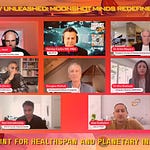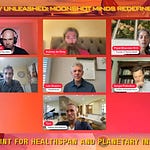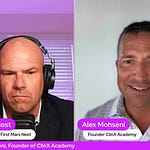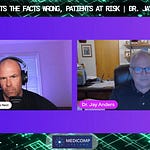Quick Pulses of Full Conversation: Tachyons, Soundbites, Takeaways..
Reimagining Healthcare Records
Yeah, I think you're so right. I've had many health care advocates on very vocal, very, very informed on processes and how to do it. And they one of the shows that we had, they referred to it not as a medical record. It's a billing record, because a lot of times, you know, when you look at it, if you get it, it's just crap. I mean, I mean, I hope this will accelerate. Those were built to be transactional at the beginning, and the DNA of the EHR is transactional health care records to drive billing use cases. And then there's all kinds of stuff that's been built on top of it since then. But they have that. It's not even like the premise. It's not even personalized. It's not even your medical record. I think the future of health care will be more personalized. engaged and directed by the consumer, i.e. the patient. Because if you told me that this was my medical record, I would argue full on out.
Turning Wasted Energy into Bitcoin: Innovative Approach
So an example of something that I'm really proud that we're doing is at some of the oil flare gas sites in Texas, they're essentially just burn off wasted production and that creates methane. produced into our atmosphere. And so what we've done is we've co-located micro mines of small implementations of Bitcoin miners next to these flare gas sites. And we consume the wasted energy that would otherwise just be burned off. And we convert that energy into Bitcoin through the mining process. So then there's an asset that can be traded and monetized that can be shared with the infrastructure, the energy company that's helping us, which is essentially turning trash into gold is a fun way to think about it.
The Role of Fractional Product Leadership in Innovation
I've spent uh man it feels I guess I have a gray beard now I've been doing product for 20 something years, probably 25 years at this point. Um, so I've been sitting at the intersection of, uh, sort of vision strategy and execution. I get to work cross-functionally with a lot of folks, uh, between tech, uh, design, marketing, business strategy and finance to understand where should we play and how should, how do we think we can win in that space and then produce the thing to deliver the value we're trying to create for the end user. Over the last year, I've been operating as a fractional product leader, which is sort of newish school way of saying like part-time contract product leadership. Um, and what I'm doing is really helping companies glean those insights with, uh, the vision strategy and execution. Where should we play? How can we win? What should we deliver to do that? Uh, without having the, the full tilt cost of somebody to be on payroll. That's especially important. I think in healthcare and climate where the stakes are just really high. The sales cycle sales cycles are really, really long. And so having somebody like me on payroll that's, you know, at least a 350K base salary before you have benefits and all the incentives on top of that is a huge drain on early stage companies. But for early stage companies to be able to get to play in these spaces. that have such high costs and high sales cycles, but, you know, require real deep thinking. People like me who can do that in a part-time way at a much lower clip for them really serve a need, I think, in the market. So that's what I've been up to. I'm lucky to at the same time work in the crypto blockchain world and the healthcare world and the climate world by way of the crypto world and some of my other subclients in that space. So it's been fun to sit at this intersection that I care so deeply about.
AI Transforming Healthcare: Past and Present
AI is obviously like Super sexy these days, but AI in healthcare specifically has been around quite some time. We called it probably machine learning at the time. But the algorithms have been doing things in healthcare for a while, like diagnosing diseases earlier and more accurately. An example of how I've seen that come to life is my father-in-law is a radiologist. Radiologists typically used to have to look at x-rays and such and figure out what may or may not be going on with the individual case that they're looking at. That is all augmented by AI now and really started probably five or six years ago in earnest. So the AI will do an initial read, highlight things in an x-ray, for example, that the then radiologist double checks and then does their own check. And that helps them find things that they may have otherwise missed. There's a really cool company in London that I love called Astron Health that's coming to market. They do precision oncology and they use AI to determine based on somebody's specific case, what off-label use cases of drugs can be used to treat them specifically. So this is cancer treatment that is personalized by AI searching for specific drugs that can be combined to attack a person's specific problem
US Treasury Reserve and Bitcoin: Future Implications
I think it's going to keep climbing, especially if we enter the whole US Treasury Reserve of Bitcoin specifically, like that is going to be a monumental shift in the understanding of what this can do. And if the US does that, I can only imagine the follow on or knock on effects for other countries that will then have to also have a reserve And if that's true, then there's going to be a huge ramp in front of us. Tell me about that as a legislative thing going on to explain a little more on that one. I'm probably not the best expert here, but what I can speak to is Trump's administration is considering having a large reserve of Bitcoin, just like we do with gold as a reserve asset to anchor our currency. And if that's the case, that means the government needs to buy a lot of Bitcoin to have that strategic reserve. And they need to put a lot of tooling and technology in place to manage and preserve that reserve. If that's the case, and that's something that is anchoring the value of our currency, then a lot of other countries who depend on the value of our currency will have to follow suit, which will drive more production and ownership of the asset.
AI Innovations in Climate Tech and Energy
AI on the climate tech side or just like energy side of things, let's call it. Um, has been around for some time optimizing energy consumption. There's things like smart grid technologies that balance demand in real time, or at least try to balance demand in real time by predicting what loads may be coming online and what type of energy consumption may be required in any given period. There's a whole world of virtual power plants coming online today and are online today. There's a really cool company called Renew Home that spun out of Google and paired up with a company called Home Connect that's been around for some time that's basically turning a bunch of residential homes and maybe some CNI. into what we're calling virtual power plants. So think of distributed systems that allow us to understand load at all these individual nodes and manage the load consumption across the network that are heavily leaning into AI machine learning technologies. But beyond optimizing load or consumption or let's call it diagnoses in healthcare, there's all the like really unsexy stuff, like I said, like scheduling and resource allocation, coming up with personalized communication or care plans or care navigation use cases in healthcare. There's a lot of really fun, cool stuff going on that's been going on for a long time, even before ChatGPT was cool.
Challenges of the Aging Power Grid
The grid is, if not the oldest machine, one of the oldest machines we built in the country that's still operating. And what that means is there's a lot of the infrastructure that needs an overhaul. Transmission delivery seems to be one of those bottlenecks. So when you think of TND, what I'm talking about is the pipes and wires that lead to your home or the buildings that you're in bring the power from the substation to your light switch, let's call it. Those wires that you see on the side of the roads and leading into those substations are really old. And we're built with some capital expenditure at the time that we've been paying as what the industry likes to refer to us as rate payers for. However, we need to overhaul that stuff so that we can get more power through the same infrastructure. The wires are old. They don't transmit electricity at the rates that they could with the new technologies that exist today. All of that new technology and new wiring that needs to be done is going to come at a significant investment in each of the different markets that need to do this or utilities or grids that need to do this which is all going to get passed downstream to us as the ratepayers so that's a big bottleneck for getting more renewables or just energy online and transmitted to the load required to um or the load that needs it, I can say.
Chris’s social handles:
Websites
advisorycollective.us - this is his collective of fractional executives that are all working like he is. The Advisory Collective.us facilitates engagements across fractional execs like CEOs, COOs, CROs, CTOs, CPOs, etc.
MARA Public Updates that your audience might find cool/interesting
Find us & follow us:
😍 💕 🌍 💜 😊 🚀Most important thing is to subscribe to keep updated with our latest podcasts, newsletters...etc.
Planetary Health First Mars Next is a reader-supported publication. To receive new posts and support my work, consider becoming a free or paid subscriber.
Planetary Health First Mars Next is a reader-supported publication. To receive new posts and support my work, consider becoming a free or paid subscriber.
Subscribed
We might just lift off to Mars if the orbit is right! 😍 💕 🌍 💜 😊 🚀
In love & kindness,
Michael Mann, (😍 💕)
Disclaimer: the views of the participants are their own only and do not reflect the views of other participants, participants' organizations, etc or Planetary Health First Mars Next or the Host…….
This podcast is for informational purposes only and should not be considered professional or medical advice.
In addition if there are any mistakes or facts that need to be corrected please feel free to reach out to us so we can correct any statement.
Understand we are a self published entity and do the best we can.
If you have an idea or have an inspiring topic or know anyone that would be a great guest for our show please reach out to michael@planetaryhealthfirstmarsnext.org










